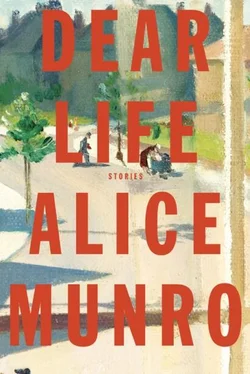Jimmy said that it wasn’t such an old person. The name was Wolfe. The first name slipped his mind.
“Not Lillian? Not Lillian Wolfe?”
He believed it was.
And her name proved to be right there, in the library edition of the local paper, which Corrie never read. Lillian had died in Kitchener, at the age of forty-six. She was to be buried from the Church of the Lord’s Anointed, the ceremony at two o’clock.
Well.
This was one of the two days a week that the library was supposed to be open. Corrie couldn’t go.
The Church of the Lord’s Anointed was a new one in town. Nothing flourished here anymore but what her father had called “freak religions.” She could see the building from one of the library windows.
She was at the window before two o’clock, watching a respectably sized group of people go in.
Hats didn’t seem to be required nowadays, on women or men.
How would she tell him? A letter to the office, it would have to be. She could phone there, but then his response would have to be so guarded, so matter-of-fact, that half the wonder of their release would be lost.
She went back to Gatsby , but she was just reading words, she was too restless. She locked the library and walked around town.
People were always saying that this town was like a funeral, but in fact when there was a real funeral it put on its best show of liveliness. She was reminded of that when she saw, from a block away, the funeral-goers coming out of the church doors, stopping to chat and ease themselves out of solemnity. And then, to her surprise, many of them went around the church to a side door, where they reentered.
Of course. She had forgotten. After the ceremony, after the closed coffin had been put in its place in the hearse, everybody except those close enough to follow the dead and see her put into the ground would head for the after-the-service refreshments. These would be waiting in another part of the church, where there was a Sunday School room and a hospitable kitchen.
She didn’t see any reason that she shouldn’t join them.
But at the last moment she would have walked past.
Too late. A woman called to her in a challenging—or, at least, confidently unfunereal—voice from the door where the other people had gone in.
This woman said to her, close up, “We missed you at the service.”
Corrie had no notion who the woman was. She said that she was sorry not to have attended but she’d had to keep the library open.
“Well, of course,” the woman said, but had already turned to consult with somebody carrying a pie.
“Is there room in the fridge for this?”
“I don’t know, honey, you’ll just have to look and see.”
Corrie had thought from the greeting person’s flowered dress that the women inside would all be wearing something similar. Sunday best if not mourning best. But maybe her ideas of Sunday best were out of date. Some of the women here were just wearing pants, as she herself was.
Another woman brought her a slice of spice cake on a plastic plate.
“You must be hungry,” she said. “Everybody else is.”
A woman who used to be Corrie’s hairdresser said, “I told everybody you would probably drop in. I told them you couldn’t till you’d closed up the library. I said it was too bad you had to miss the service. I said so.”
“It was a lovely service,” another woman said. “You’ll want tea once you’re done with that cake.”
And so on. She couldn’t think of anybody’s name. The United church and the Presbyterian church were just hanging on; the Anglican church had closed ages ago. Was this where everybody had gone?
There was only one other woman at the reception who was getting as much attention as Corrie, and who was dressed as Corrie would have expected a funeral-going woman to be. A lovely lilac-gray dress and a subdued gray summer hat.
The woman was being brought over to meet her. A string of modest genuine pearls around her neck.
“Oh, yes.” She spoke in a soft voice, as pleased as the occasion would allow. “You must be Corrie. The Corrie I’ve heard so much about. Though we never met, I felt I knew you. But you must be wondering who I am.” She said a name that meant nothing to Corrie. Then shook her head and gave a small, regretful laugh.
“Lillian worked for us ever since she came to Kitchener,” she said. “The children adored her. Then the grandchildren. They truly adored her. My goodness. On her day off I was just the most unsatisfactory substitute for Lillian. We all adored her, actually.”
She said this in a way that was bemused, yet delighted. The way women like that could be, showing such charming self-disparagement. She would have spotted Corrie as the only person in the room who could speak her language and not take her words at face value.
Corrie said, “I didn’t know she was sick.”
“She went that fast,” the woman with the teapot said, offering more to the lady with the pearls and being refused.
“It takes them her age faster than it does the real old ones,” the tea lady said. “How long was she in the hospital?” she asked in a slightly menacing way of the pearls.
“I’m trying to think. Ten days?”
“Shorter time than that, what I heard. And shorter still when they got around to letting her people know at home.”
“She kept it all very much to herself.” This from the employer, who spoke quietly but held her ground. “She was absolutely not a person to make a fuss.”
“No, she wasn’t,” Corrie said.
At that moment, a stout, smiling young woman came up and introduced herself as the minister.
“We’re speaking of Lillian?” she asked. She shook her head in wonder. “Lillian was blessed. Lillian was a rare person.”
All agreed. Corrie included.
“I suspect Milady the Minister,” Corrie wrote to Howard, in the long letter she was composing in her head on the way home.
Later in the evening she sat down and started that letter, though she would not be able to send it yet—Howard was spending a couple of weeks at the Muskoka cottage with his family. Everybody slightly disgruntled, as he had described it in advance—his wife without her politics, he without his piano—but unwilling to forgo the ritual.
“Of course, it’s absurd to think that Lillian’s ill-gotten gains would build a church,” she wrote. “But I’d bet she built the steeple. It’s a silly-looking steeple, anyway. I never thought before what a giveaway those upside-down ice-cream-cone steeples are. The loss of faith is right there, isn’t it? They don’t know it, but they’re declaring it.”
She crumpled the letter up and started again, in a more jubilant manner.
“The days of the Blackmail are over. The sound of the cuckoo is heard in the land.”
She had never realized how much it weighed on her, she wrote, but now she could see it. Not the money—as he well knew, she didn’t care about the money, and, anyway, it had become a smaller amount in real terms as the years passed, though Lillian had never seemed to realize that. It was the queasy feeling, the never-quite-safeness of it, the burden on their long love, that had made her unhappy. She had that feeling every time she passed a postbox.
She wondered if by any chance he would hear the news before her letter could get it to him. Not possible. He hadn’t reached the stage of checking obituaries yet.
It was in February and again in August of every year that she put the special bills in the envelope and he slipped the envelope into his pocket. Later, he would probably check the bills and type Lillian’s name on the envelope before delivering it to her box.
The question was, had he looked in the box to see if this summer’s money had been picked up? Lillian had been alive when Corrie made the transfer but surely not able to get to the mailbox. Surely not able.
Читать дальше












